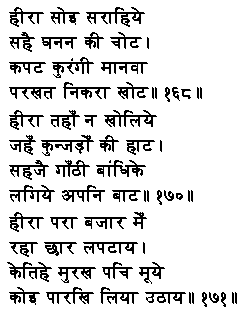
|
Kabir Mystic Philosopher |
Kabir ranks among the world's greatest poets. In India, he is perhaps the most quoted author, with the exception of Tulsidas. Kabir has criticized perhaps all existing sects in India, still he is mentioned with respect by even orthodox authors. Vaishnav author Nabhadas in his Bhakta-Mal (1585) writes:
hindU turuk pramAn ramainI sabadI sAkhI
pachchhapat nahiN bachan sabahiN ke hit kI bhAkhI
[His "ramaini" "shabda" "sakhi" (sections of his "Bijak") are accepted by Hindus and Turks alike. He spoke without discrimination for the good of all]
He lived perhaps during 1398-1448. He is thought to have lived longer than 100 years. He had enormous influence on Indian philosophy and on Hindi poetry.
His birth and death are surrounded by legends. He grew up in a Muslim weaver family, but some say he was really son of a Brahmin widow who was adopted by a childless couple. When he died, his Hindu and Muslim followers started fighting about the last rites. The legend is that when they lifted the cloth covering his body, they found flowers instead. The Muslim followers buried their half and the Hindu cremated thier half. In Maghar, his tomb and samadhi still stand side by side.
Here I quote some of his verses from his "Bijak", from the section called "sakhi". My translation follows the Gurumukh TIkA by Puran Sahib done perhas a century ago. He was associated with the Kabirpanthi center at Burhanpur. Kabir's writings can be hard to translate, not only because the language is old, but Kabir's expressions are different from what we are used to seeing.
The verses below use the term "hira" (diamond). It
should be noted that during the time of Kabir,
diamonds were very rare. At that time, diamonds
were found only in India and nowhere else.

Bijak/Sakhi 168:
hIrA soi srAhiye
sahai ghanan kI choT
kapaT kurangI mAnavA
parakhat nikrA khot
Admire the diamond that can bear the hits of a hammer. Many deceptive preachers, when critically examined, turn out to be false.
[Here diamond is siddhanta (the basic principles or doctrine).An experienced diamond cutter can hit the diamond using a chisel so that the chips will break off as expected. A diamond because if its crystalline structure tends to break off at specific angles. Similarly the true doctrine would come out shining when it is critically examined].
Bijak/Sakhi 170:
hIrA tahaN na kholiye
jahaN kunjroN kI hAT
sahajai gaNthI bANdhike
lagiye apni bAT
Don't open your diamonds in a vegetable market. Tie them in bundle and keep them in your heart, and go your own way.
[Don't discuss gyan (knowledge) with those who can not understand it].
Bijak/Sakhi 171:
hIrA parA bajAr maiN
rahA chhAr lapaTAy
ketihe murakh pachi mUye
koi pArakhi liyA uThAy
A diamond was laying in the street covered with dirt. Many fools passed by. Someone who knew diamonds picked it up.
[Those who understand gyan-siddhanta (true knowledge/principles), pause to acquire it].
|
|
Translated by Rabindranath Tagore
Do not go to the garden of flowers!
Hang up the swing of love today! |
also see
 The Divine Oneness
The Divine Oneness
 26 of Kabir's Saying
26 of Kabir's Saying 
 Subtle Fabric of the Human Being
Subtle Fabric of the Human Being
 boloji
boloji
 When shall I see you again my love?
When shall I see you again my love?
 India World,
more,
trans. by Tagore
India World,
more,
trans. by Tagore

 Between the conscious and the unconscious ,
Between the conscious and the unconscious ,
 Popular dohe,in xdevnag ,
Popular dohe,in xdevnag ,
 Selections from Bijak
Selections from Bijak
 Selected poems: World Reader
Selected poems: World Reader
 Osho on Kabir
Osho on Kabir
 The Radiance: Kabir
The Radiance: Kabir
 Four poems translated by Robt. Bly
Four poems translated by Robt. Bly
 Kabirdas itihaas
Kabirdas itihaas
 Kabir in pictures
Kabir in pictures
 Ram-Kabir temple
Ram-Kabir temple
 Kabir's Dohas
Kabir's Dohas
 Back to Hindi Poets
Back to Hindi Poets